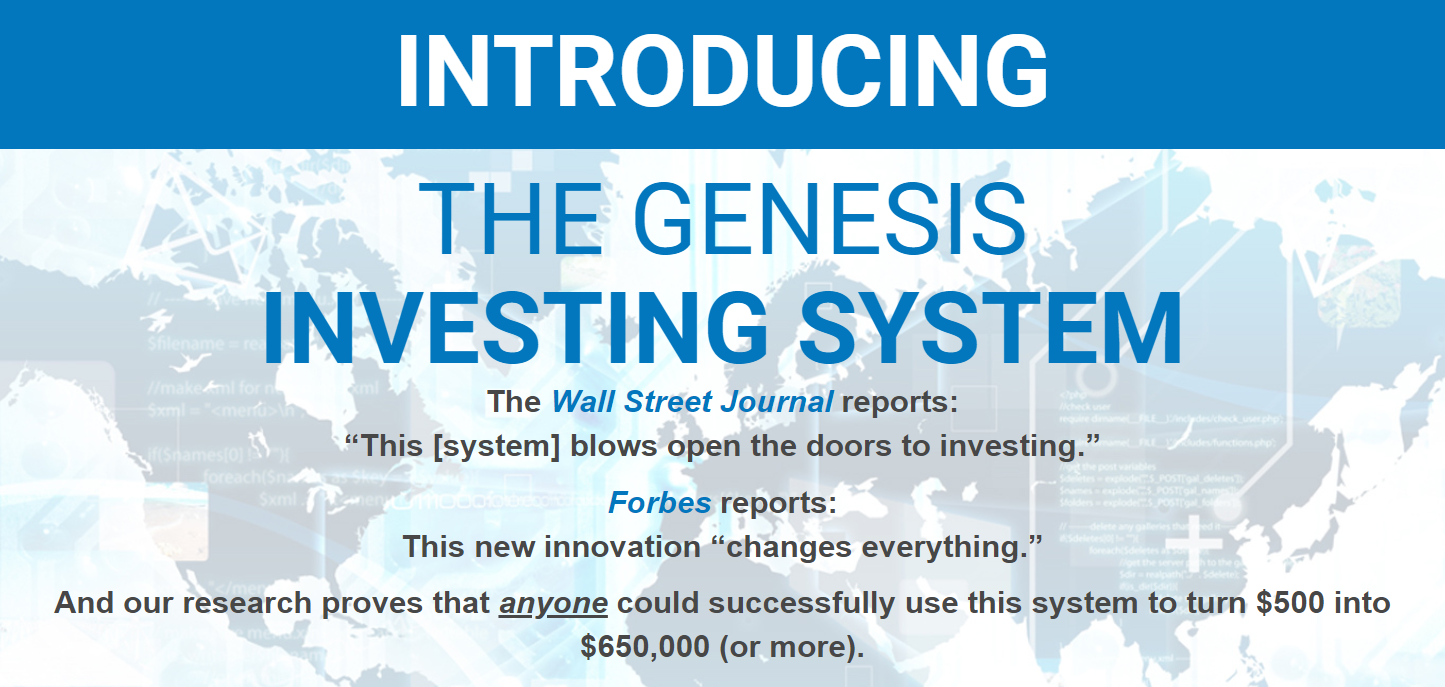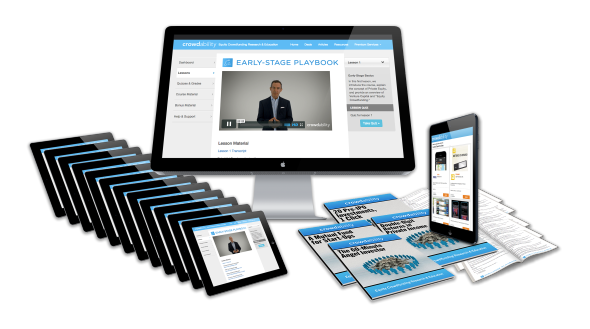What are these “Genesis Investments” that Matt Milner is teasing and are they really that great of an opportunity?
In this quick review I'll be going over what exactly “genesis investments” are and the potential they have, risks involved, the Early-Stage Playbook that Matt Milner is pushing (aka the “Genesis Investing System”) and more.
I recently came across more than one teasers for this opportunity… one titled “The Dow Is Dead” and the other “The Genesis Investing System”…


The presentations were both put on by Matt Milner, and some of the things he mentioned were include:
- these have nothing to do with traditional investments
- have returned far more than stocks – 55% per year on average
- “Genesis Investments could generate an absolute fortune for you and your family”
- “for nearly a century, the U.S. Government made it a CRIME to share information about Genesis Investing with the general public” – due to some old Kennedy-era SEC rule (Joe Kennedy)
- It's part of an “underground market”
- There's some “loophole” that allows people to take part in this “genesis investing”
The presentation then went on to mention people who have been making these kinds of investments and profiting insane amounts…

But as always, the presentation makes this opportunity sound a bit too good to be true. It almost sounds like a sure-fire way to strike it rich, but the reality is much different.
And you also have to take into account that this is all a sales pitch… trying to lure in people to purchase his Early Stage Playbook course.
What The Heck Are “Genesis Investments”?
What Milner is referring to when he says “genesis investments” are investments in private equity – companies that are early-stage and not yet publicly traded on the stock exchanges.
Investing in private equity is typically only available to accredited investors and qualified clients. In other words… it's not available to the general public.
However, congress recently pushed through a new law – H.R. 3606 which is the Jumpstart Our Business Startups Act, or JOBS Act – and this is a SEC amendment to an old 1933 Great Depression-era law. The important part of this law, and the most well known, is Title III. This is called the CROWDFUND Act and basically allows companies to issue securities via crowdfunding. This went into effect in 2016 and the reason it's relevant here is because it opens up these opportunities to the general public. The law was signed off on by the President in 2012 and was created to help out small businesses in the post-2008 recession times.
Anyone can go to websites like Kickfurther, SeedInvest, and WeFunder to find these sorts of crowdfunding investment opportunities. Prior to this you would have needed millions of dollars to invest as a venture capitalist or angel investor… but this has changed all of that.
Sounds great, but isn't this risky?
Yes it is, or at least it certainly can be. Investing in small start-up companies is always a bigger risk than developed companies that have withstood the test of time. Not only that, but this also opens the door to scammers. And something else worth mentioning is that many of the companies you'll find on these websites that are looking for investments are using these sorts of crowdfunding websites because they probably failed to gain support from venture capitalists and whatnot.
That said, There is a process that is used to help mitigate the chances of making too risky of an investment…
The “ASE Process”
- A – Allocate – tells you how much money to put into the early-stage investment
- S – Screen – screen out the more risky investments
- E – Evaluate – take and in-depth look at the company and see if it displays certain characteristics
In the Evaluation step Matt Milner looks at 24 different indicators, one of the main ones being “The VC Indicator”. He looks at who else is investing in the company… for top venture capitalists investing.
However, as you can imagine this won't be all that common. If venture capitalists are investing there is a good chance the opportunities aren't going to be available to the public on crowdfunding platforms.
Who Is Matt Milner?

Matt Milner is one of the co-founders of Crowdability, which is a crowdfunding investment education platform.
His background includes that he used to work on Wall Street for Bear Stearns as well as Lehman Brothers in their Sales & Trading departments, has sold tech giant start-ups to large companies, has written for Forbes, Market Watch and The Wall Street Journal, and his education includes a BA from Cornell University as well as an MBA from the Kellogg School of Management at Northwestern University.
In short, he has a very solid background and seems like the type of guy you'd want to listen to when investing in start-ups.
..and Wayne

Wayne Mulligan is the other co-founder of Crowdability and also provides training in the Early Stage Playbook course. He has a background as a Financial Media executive on Wall Street and before that worked as a programmer, founded his own programming platform called TickerHound that helped investors find answers to investment questions, and became CEO of the company that ended up buying out this TickerHound tech platform – also a solid background.
Early Stage Playbook

This is an interactive online course that consists of 12 video lessons and teaches people how to invest in early-stage companies through crowdfunding.
The course is a compilation from the help of over 30 venture capitalists and angel investors. Along with their own knowledge, Matt and Wayne interviewed over 30 venture VC's and angel investors to put this course together.
The main focus is, obviously, on early-stage investing – members will learn how to research and find good investment opportunities on crowdfunding platforms. However, there is a bunch of additional information provided, such as lessons on investing in pre-IPO companies, which is a “later-stage” than what we are normally talking about here when we say “early-stage”, buying private equity in your 401k and IRA, and more.
The normal price for the cheapest level of Early Stage Playbook (there are 3 price options) is $250, but through the funnel I was lured in through there was a discount for a one-time payment of just $39.
Pros v Cons
Pros
- Huge profit potential in investing in early-stage companies
- Early-Stage Playbook is well laid-out and easy to follow
- Teaches people how to become investors themselves, rather than just blindly following advice… which is what most investment services do, like 100x Club and IPO Speculator for example
- Matt Milner and Wayne Mulligan both have good backgrounds – plus, the course was put together with input from over 30 venture capitalists and angel investors
Cons
- Early-stage investing certainly comes with risks – most companies on these crowdfunding platforms will go on to fail miserably
Recap & Thoughts
- “Genesis investing” is just a made-up term that refers to investing in private equity via crowdfunding
- This new crowdfunding private equity investment opportunity just came around in 2016 after some new laws were passed
- The Early Stage Playbook, aka the “Genesis Investing System”, is an online early-stage investment course – and this is what Matt Milner is trying to sell
One of the big issues I have with the whole sales pitch around this investment opportunity is how they talk so much about big gains but almost say nothing about risk. The fact of the matter is that investing in early-stage companies via crowdfunding is a risky way to invest. Yes, you could make a lot of money… but most of the companies on these crowdfunding platforms will fail and you also have to remember that the reason they are even being listed on the crowdfunding platforms in the first place is probably because venture capitalists wanted nothing to do with them.
The “Playbook” does provide information on how to mitigate risk and will help in this regard – it goes over the screening and evaluation process to weed out the companies that are too risky – but still, it's risky business.
On a positive note, one thing that I actually really like about this course, which I briefly mentioned in the Pros v Cons section, is that it is a training course that actually teaches people how to become good early-stage investors in their own right. This is like teaching a man to fish, rather than just giving him a fish… which is what most of the investment advisory services out there do.
All in all it seems to be a pretty good course, but certainly isn't for everyone. If you are tight on money and can't afford to lose any, this probably isn't for you.
Now it's your turn: what do you think of “genesis investments” and all of this?

